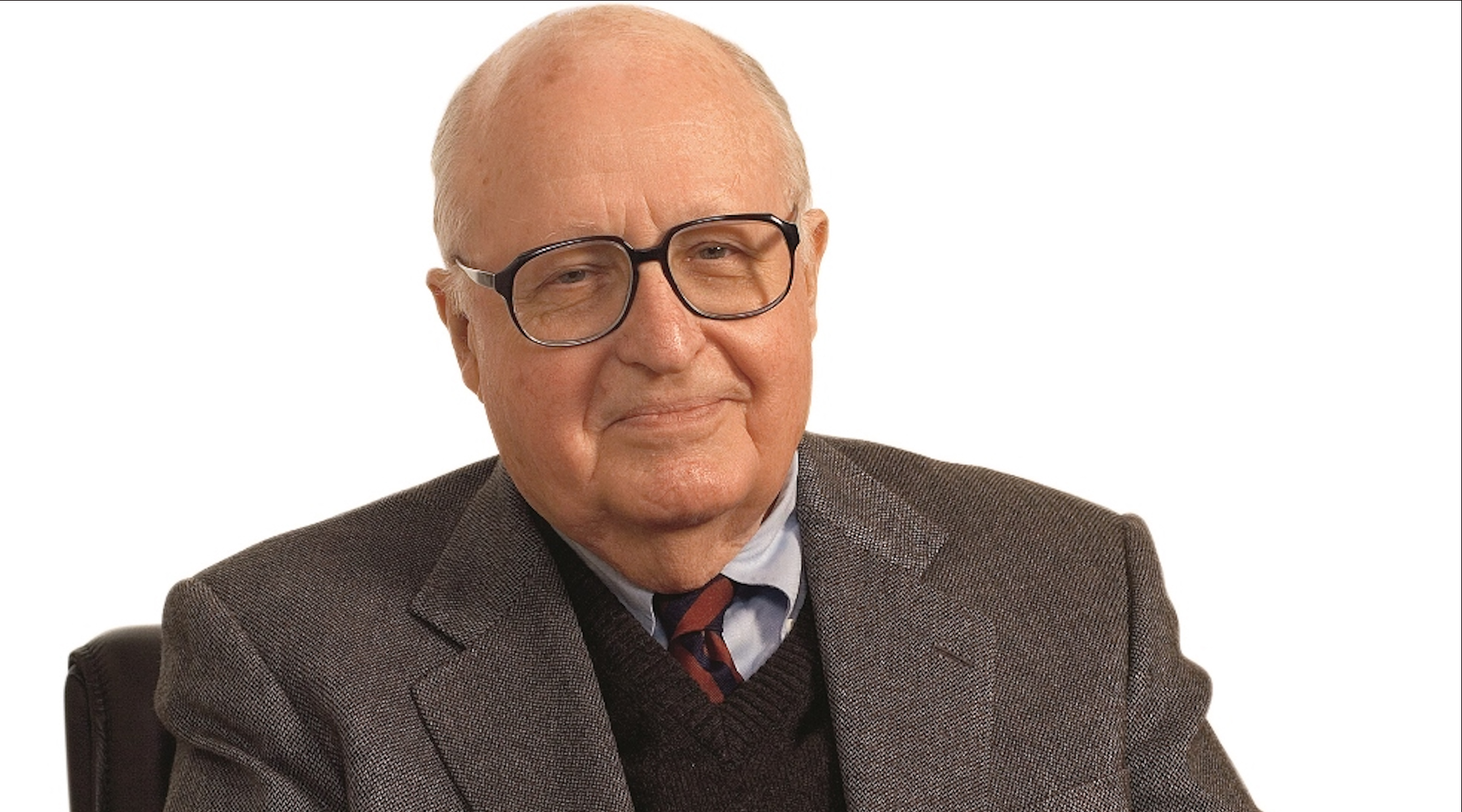Henry Rosovsky, refugee from the Nazis who shaped Harvard University, dies at 95
The economist left behind an outsized legacy for both Jewish and Black Harvard students

Henry Rosovsky was a longtime leader at Harvard University. He died in November 2022 at 95. (Jim Harrison/Courtesy of Harvard Hillel)
BOSTON (JTA) — When Harvard University’s rabbi first pushed to relocate the Hillel from the outskirts of campus to its center, Henry Rosovsky was initially skeptical.
“He was absolutely right. I was wrong,” Rosovsky told the Jewish Telegraphic Agency in 2017, at a 25th anniversary party for the Hillel building that bears his name: Rosovsky Hall.
The event was also a 90th birthday party for Rosovsky, an economist who spent his entire career at Harvard, spanning decades in which he influenced the school’s curriculum, led a committee charged with improving conditions for Black students and shepherded the flourishing of Jewish life on campus.
Rosovsky died Nov. 11 at his home in Cambridge, Massachusetts, where he lived and worked since joining the Harvard faculty in 1965. He was 95.
“His legacy continues to influence the experience of every person on our campus today,” Harvard President Lawrence Bacow, who is Jewish, told the Jewish Telegraphic Agency. “With his passing, Harvard has lost one of its greatest champions and its finest citizens.”
At his funeral at Temple Israel of Boston, Rosovsky was remembered by family, colleagues and friends for his brilliance, witty humor, love of tennis and jazz, and his sage advice and mentorship.
His daughter, Leah Rosovsky, said her father took his greatest satisfaction in the role he played in establishing what is now Harvard’s African and African American Studies Program and recruiting its longtime chair, historian Henry Louis Gates Jr., who attended the funeral.
Born in a Jewish family on Sept. 1, 1927 in what is now Gdansk, Poland, Rosovsky immigrated to the United States with his parents and brother in 1940, after escaping the Nazis through France, Portugal, Spain and Belgium. He volunteered for the U.S. Army in World War II and also served in the Korean War, according to an obituary published by Harvard. After graduating from the College of William and Mary, he arrived at Harvard for the first time in 1949 to pursue a doctorate in economics.
In 1965, he returned as a professor of economics, with a specialty in Japanese and Asian economic development. He would stay at the university for the rest of his career, shaping not only the Ivy League college but Boston’s Jewish community.
As dean of Harvard’s College of Arts and Sciences from 1973 to 1991, Rosovsky led implementation of the school’s groundbreaking core curriculum. He also served two terms as Harvard’s acting president; was appointed a member of the Harvard Corporation, where he was the first Jew on the school’s governing body; and oversaw the establishment of Harvard’s Center for Jewish Studies.
In 1969, with student unrest spurring changes at many universities, Rosovsky led a committee to study the experience of Black students at Harvard. The resulting “Rosovsky report” urged the creation of a standalone department for African and African American studies and other steps to integrate and empower Black students. Rosovsky quit the committee after students were given equal say, a move that he said should have taken place only after careful study. He resumed his involvement shortly before his retirement in the 1990s, recruiting high-profile scholars including Gates to transform the department into an academic powerhouse.
Rosovsky’s 1990 book “The University: An Owner’s Manual,” exposed outsiders to the complex operations of a research university. But the former dean was equally helpful to university insiders, Bacow said, noting the time Rosovsky devoted to doling out advice to college presidents. Several of Harvard’s presidents, including Drew Gilpin Faust, Lawrence H. Summers and Neil Rudenstine, echoed that sentiment in published remarks at the celebration of his 90th birthday.
His reach extended beyond Harvard, too. As chair of the Boston Jewish federation’s strategic planning committee in the 1990s, Rosovsky shared his analytical expertise and his ability to bring people together to help chart a course for Boston’s Jewish community, according to Barry Shrage, who for decades led the Combined Jewish Philanthropies of Greater Boston.
“It was a turning point in terms of Jewish learning, adult Jewish education, building community at the grassroots and engaging synagogues,” Shrage told JTA in a conversation at the funeral. “It all emerged in the strategic plan.”
Shrage added, “He was a secular Jew but his Jewish identity deeply influenced his vision of the world.”
Rosovsky is survived by Nitza, his wife of 66 years and a former longtime curator of the Semitic Museum at Harvard; his children, Leah, Judy and Michael and their spouses; four grandchildren; and one great-granddaughter.
“He didn’t set out to trumpet his own Jewish identity,” Rabbi Jonah Steinberg, Harvard Hillel’s executive director, told JTA in 2017 about Rosovsky. “By being very honestly who they are, they were an example to others.”
This article originally appeared on JTA.org.
A message from our CEO & publisher Rachel Fishman Feddersen
I hope you appreciated this article. Before you go, I’d like to ask you to please support the Forward’s award-winning, nonprofit journalism during this critical time.
We’ve set a goal to raise $260,000 by December 31. That’s an ambitious goal, but one that will give us the resources we need to invest in the high quality news, opinion, analysis and cultural coverage that isn’t available anywhere else.
If you feel inspired to make an impact, now is the time to give something back. Join us as a member at your most generous level.
— Rachel Fishman Feddersen, Publisher and CEO